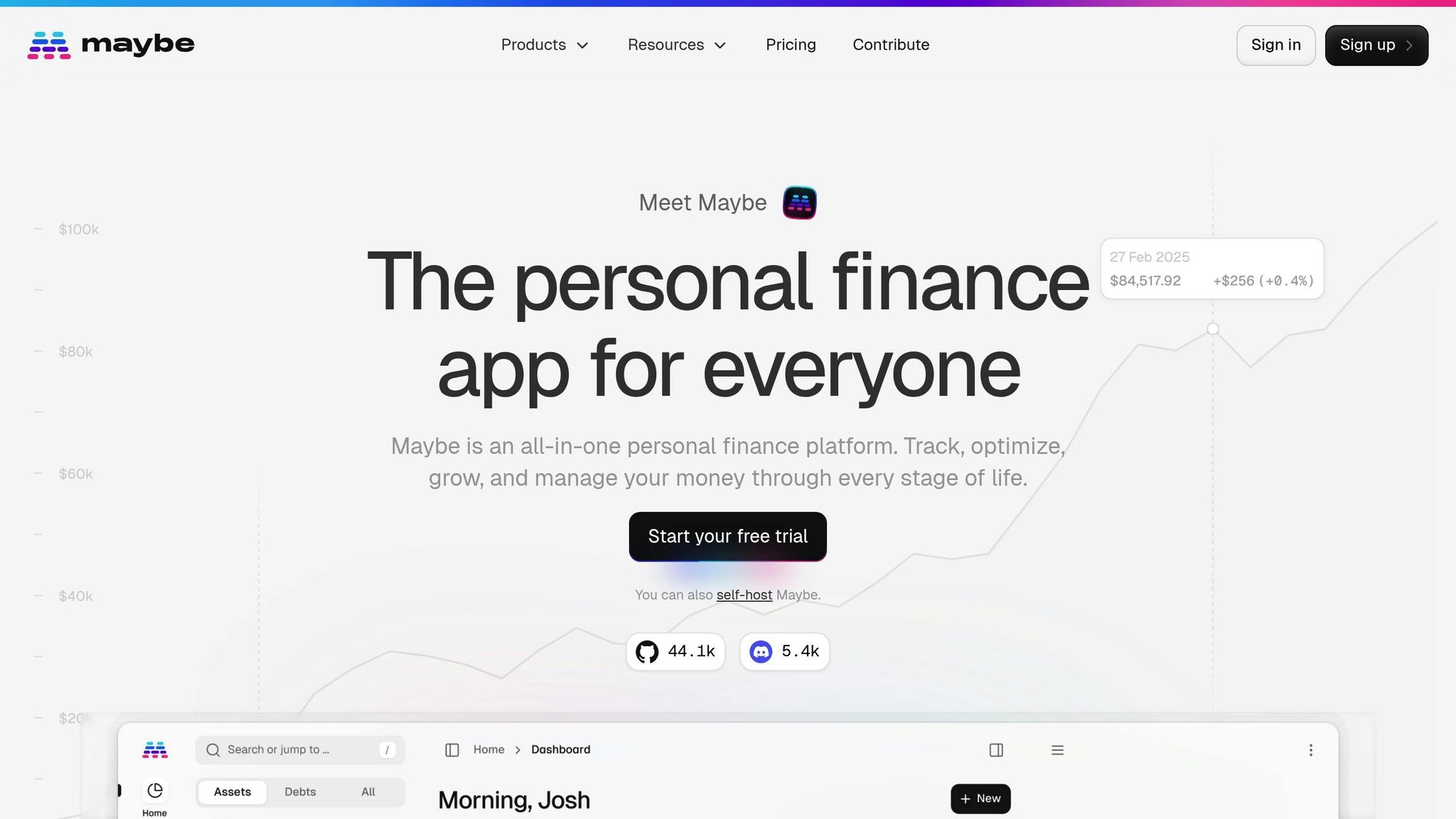AI in Personal Finance: Benefits and Limitations

Josh Pigford
AI is transforming personal finance by automating tasks, offering tailored recommendations, and helping users save and invest more efficiently. Here's what you need to know:
Key Benefits:
- Automates tasks like budgeting and tax preparation.
- Saves users up to 30% more per month with automated savings tools.
- Provides 24/7 financial insights and reduces costs compared to traditional advisors.
Limitations:
- AI may miss nuances like personal priorities or specific financial circumstances.
- Data privacy and security risks remain a concern.
- Over-reliance on AI could reduce personal involvement in decision-making.
Practical Advice:
- Use AI tools for repetitive tasks but double-check their insights.
- Keep critical financial decisions in your hands.
- Regularly review automated processes to stay in control.
AI excels at processing data and identifying trends, but human oversight is still essential for personalized financial decisions. By combining AI's efficiency with your judgment, you can take smarter steps toward financial success.
1. Maybe Finance Features

Automatic Tasks
Maybe Finance simplifies money management by connecting with over 10,000 financial institutions. It links all your accounts, automatically categorizing and tracking transactions across them. This automation eliminates the need for manual data entry, saving you time and reducing the chances of errors creeping into your records.
Custom Financial Analysis
The platform doesn’t just track your spending - it actively helps you manage it. By analyzing your financial habits and goals, Maybe Finance provides tailored recommendations for budgeting and planning. If you deal with international finances, the multi-currency support is a game-changer. It automatically converts and tracks assets across different currencies, making global money management far less complicated.
Data Protection
Security is a top priority when it comes to your financial information. As Maybe Finance puts it:
"We treat your financial data like we'd want ours to be treated, by using strong encryption and secure authentication."
The platform uses commercial-grade security features to safeguard your data from unauthorized access or breaches. Plus, its open-source nature adds a layer of trust, letting users review and verify the security measures in place.
Price and Access
Maybe Finance keeps its pricing simple with two subscription options:
| Plan | Cost | Features |
|---|---|---|
| Monthly | $9/month | Full access to AI insights, unlimited accounts, and transaction tracking |
| Annual | $90/year | Same features as the monthly plan, with 17% savings |
Both plans include essential features like transaction categorization, custom financial analysis, and multi-currency support. If you’re in it for the long haul, the annual plan offers great value with notable savings.
Benefits and Drawbacks
AI-powered financial management offers a mix of advantages and challenges, making it crucial to weigh both sides before diving in. Here's a closer look at what it brings to the table:
| Benefit | Impact | Limitation | Risk Factor |
|---|---|---|---|
| Real-Time Analysis | Provides instant insights into spending and detects patterns | Algorithm Limitations | May overlook the nuances of personal circumstances |
| Automated Savings | Achieves up to 30% higher savings compared to manual methods | Data Privacy | Risk of exposing sensitive financial information |
| 24/7 Availability | Ensures constant access to financial guidance | Over-Automation | Could reduce personal involvement in financial decisions |
| Cost Efficiency | Offers lower fees than traditional advisors | Security Concerns | Vulnerable to potential cyber threats |
These pros and cons highlight the balance needed to make the most of AI while staying aware of its boundaries.
"They're not going to take into account a person's other assets, financial implications or implications related to their debt payouts or income. That is where talking to a real person can be the most helpful."
The rapid rise in deepfake incidents within the fintech sector - up an alarming 700% in 2023 - emphasizes the growing importance of security. Companies like Maybe Finance are tackling these risks with advanced encryption and secure authentication measures.
"Human guidance continues to be important for dealing with gray areas and modifying advice to meet each individual's own financial situation."
Final Thoughts
Bringing together the features of Maybe Finance and weighing the pros and cons, it's clear that success in money management relies on finding the right balance. AI tools are reshaping how we handle finances by combining automation with the irreplaceable value of human judgment.
"AI excels at processing massive amounts of data at lightning speed, identifying patterns and trends within financial data that might escape even the most seasoned human advisor...However, while AI offers valuable insights, it's important to remember that it is still a tool." - Brian Gunn, Chief Revenue Officer of EarnUp
To better understand how AI and human oversight complement each other, here's a snapshot of their roles in key areas:
| Area | AI's Role | Human Oversight Required |
|---|---|---|
| Basic Tasks | Transaction categorization, expense tracking | Review categorizations monthly |
| Education | Financial concept clarification | Verify information from trusted sources |
| Budgeting | Pattern identification, spending analysis | Set personal priorities and non-negotiables |
| Investment | Data processing, trend analysis | Final decision-making, risk assessment |
AI has also stepped into areas like tax forecasting and automated filing, making tedious tasks more manageable. Still, as Rachel Richards, CPA and head of product at Gelt, points out:
"Human guidance continues to be important for dealing with gray areas and modifying advice to meet each individual's own financial situation."
To make the most of AI while staying in control of your finances, consider these strategies:
- Double-check AI-generated insights using reliable sources.
- Keep decision-making in your hands for critical financial choices.
- Set clear boundaries for how AI tools analyze your data.
- Stay involved by regularly reviewing automated processes.
The future of personal finance lies in blending AI's analytical strength with human intuition. By understanding this partnership, you can use AI to streamline tasks while making informed, personalized financial decisions.
FAQs
How can I keep my financial data safe while using AI tools like Maybe Finance?
Protecting Your Financial Data with AI Tools
Keeping your financial information safe while using AI tools like Maybe Finance is crucial. Start by thoroughly reading the tool’s privacy policy to understand how your data is collected, used, and protected. Strengthen your security by creating strong, unique passwords and enabling multi-factor authentication to add an extra layer of protection. Also, stay alert to phishing scams and ensure you only log in from secure devices and trusted networks.
Maybe Finance takes your security seriously by implementing bank-grade encryption, refraining from storing banking credentials, and ensuring your data is never sold. To maintain control over your information, share only what’s absolutely necessary and regularly check the app permissions on your devices. Following these practices can help you manage your finances with confidence, knowing your data is secure.
What are the risks of depending too much on AI for managing personal finances?
AI can be a game-changer for managing personal finances, offering tools that simplify tasks and provide insights. But leaning too heavily on it isn’t without its pitfalls. One major concern is data privacy. These tools often handle sensitive financial details, and storing or processing that information could expose you to risks if security measures fall short.
Another challenge lies in how AI algorithms interpret your financial situation. While they’re excellent at analyzing numbers, they might miss the nuances of your personal goals, values, or comfort with risk. This could lead to recommendations or decisions that don’t quite match your needs.
There’s also the danger of becoming too dependent on automation. If you disengage from actively managing your finances, you might overlook errors or fail to adjust to changes in your financial landscape. To stay in control, it’s important to strike a balance - use AI as a helpful tool, but remain actively involved in your financial planning.
How can I use AI tools alongside personal judgment to make smarter financial decisions?
AI tools are a great way to simplify and refine your financial decisions, but they shine brightest when paired with your own judgment. For starters, consider using AI-powered budgeting tools. These can analyze your spending habits, sort your expenses into categories, and help you craft budgets tailored to your lifestyle. They can also pinpoint areas where you might trim costs and save more effectively.
When it comes to investments, AI-driven platforms can be incredibly helpful. They provide personalized recommendations and manage portfolios automatically, often at a lower cost. Plus, they offer insights that can guide your financial choices. On top of that, you can set up AI alerts to keep an eye on your accounts, flag unusual activity, or remind you about upcoming bills.
While AI can make managing personal finances easier, your involvement is still key. Always double-check the recommendations these tools make, especially for crucial decisions like investments, taxes, or legal matters. Think of AI as your financial assistant - it can do a lot, but your informed oversight is what ensures the best outcomes.

Subscribe to get the latest updates right in your inbox!